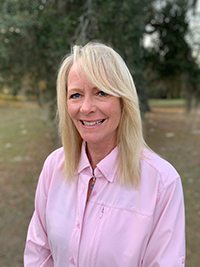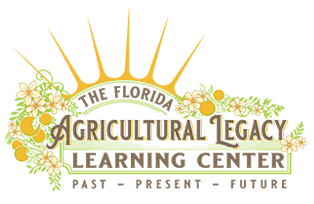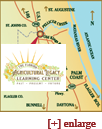The Florida Agricultural Legacy Learning Center
(Previously the Florida Agricultural Museum)
The Florida Agricultural Museum was established in 1983 by a group of concerned agriculturalists and historians at the request of Florida Department of Agriculture and Consumer Services Commissioner Doyle Conner to help preserve this important part of Florida’s heritage. Originally located in Tallahassee, the museum was part of the Division of Agriculture and Consumer Services.
In 1992, the property was designated the “Museum of Agriculture and Rural History of the State of Florida” under Florida Statute. In 1997, the Florida Agricultural Museum moved to its new home on 460 acres in Flagler County. Many of the Museum’s buildings were moved from their original locations across the state and renovated with grant funds provided by the Florida Department of State, Division of Historical Resources.
To better describe the activities offered, in 2024 the name officially changed to the Florida Agricultural Legacy Learning Center (The Florida Ag Center). The mission remains the same, which is to provide a fun and educational experience for all ages about Florida’s agricultural past and present. The Ag Center is also active in the conservation of heritage livestock including rare Florida Cracker cattle, horses, and sheep. Flagler County and the St. Augustine area lead the state in historic sites and educational facilities and is located only 25 minutes from downtown St. Augustine.
The Florida Agricultural Legacy Learning Center is a private non-profit (501.C3) corporation led by a board of trustees; public spirited volunteers from across the state who share a common interest in Florida agriculture.
A Letter from the Director:
 Welcome to The Florida Agricultural Legacy Learning Center. Our museum celebrates the past, present, and future of agriculture in Florida. Our historic buildings have been relocated to our facility from across the state. Enjoy a guided horseback trail ride. Learn about our rare heritage Cracker Cattle, Horses and Sheep in the History Tour. Rent our 1920’s dairy barn for a wedding or private event. Attend one of our fun Special Events throughout the year. We look forward to seeing you! “Let’s Grow This!”
Welcome to The Florida Agricultural Legacy Learning Center. Our museum celebrates the past, present, and future of agriculture in Florida. Our historic buildings have been relocated to our facility from across the state. Enjoy a guided horseback trail ride. Learn about our rare heritage Cracker Cattle, Horses and Sheep in the History Tour. Rent our 1920’s dairy barn for a wedding or private event. Attend one of our fun Special Events throughout the year. We look forward to seeing you! “Let’s Grow This!”
Kara Hoblick – Executive Director
NOTICE OF BOARD MEETINGS
General Meetings of the FALLC’s Board of Trustees are scheduled on the third Wednesday of each month and are held on location at
7900 Old Kings Road, N
Palm Coast, FL 32137
Code of Ethics Philosophy and Policy
It is essential to the proper conduct and operation of Florida Agricultural Museum, Inc. (“FAM”) that its trustees, officers and employees (each a “FAM Public Officer” and collectively “FAM’s Public Officers”) be independent and impartial and that their position not to be used for private gain. To that end, all applicable provisions of Part III of Chapter 112 (Sections 112.311 –
112.326) Florida Statutes, titled Code of Ethics For Public Officers And Employees, are incorporated into and constitute the basis of FAM’s Code of Ethics.
Without limiting the generality of the foregoing, FAM’s Public Officers are obligated to abide by the following standards of conduct during the time they remain in office, and in the case of item 5 below, for a period of two years thereafter:
1. Prohibition of Solicitation or Acceptance of Gifts
No FAM Public Officer shall solicit or accept anything of value, including a gift, loan, reward, promise of future employment, favor, or service, based upon any understanding that the vote, official action, or judgment of the FAM Public Officer would be influenced thereby.
2. Prohibition of Accepting Compensation Given to Influence a Vote
No FAM Public Officer shall accept any compensation, payment, or thing of value when the person knows, or, with reasonable care, should know that it was given to influence a vote or other action in which the FAM Public Officer was expected to participate in his or her official capacity.
3. Prohibition of Misuse of Position
No FAM Public Officer shall use or attempt to use his or her official position or any property or resource which may be within his or her trust, or perform official duties, to secure a special privilege, benefit, or exemption.
4. Prohibition of Misuse of Privileged Information
No FAM Public Officer shall disclose or use information not available to members of the general public that was obtained by reason of his or her official position for his or her personal gain or benefit or for the personal gain or benefit of any other person or business entity.
5. Post-Office/Employment Restrictions
No FAM Public Officer shall personally represent another person or entity for compensation before the Board of Trustees of FAM for a period of two years after he or she ceases to be a FAM Public Officer.
6. Prohibition to Employees Holding Office
No person may be both a member of FAM’s Board of Trustees and an employee of FAM at the same time.
7. Requirements to Abstain From Voting
No FAM Public Officer shall vote or otherwise take action in his or her official capacity on any measure which would affect his or her private gain or loss, or which he or she knows would affect the gain or loss of a third party by whom the FAM Public Officer is retained. When abstaining, prior to the vote being taken, the FAM Public Officer shall make every reasonable effort to disclose the nature of his or her interest as a public record in a memorandum filed with FAM’s Secretary, who shall incorporate the memorandum in the minutes. If it is not possible for the FAM Public Officer to file a memorandum before the vote, the memorandum shall be filed with FAM’s Secretary no later than fifteen days after the vote.
8. Failure to Observe FAM’s Code of Ethics
Failure of a FAM Public Officer to observe this Code of Ethics may result in the removal of that person from his or her position. FAM acknowledges that the failure of FAM or a FAM Public Officer to observe this Code of Ethics may result in the Florida Department of Agriculture and Consumer Services terminating its agreement with FAM.


